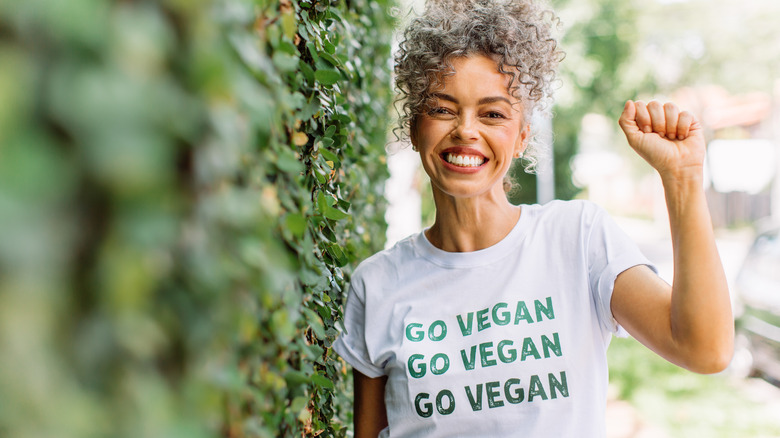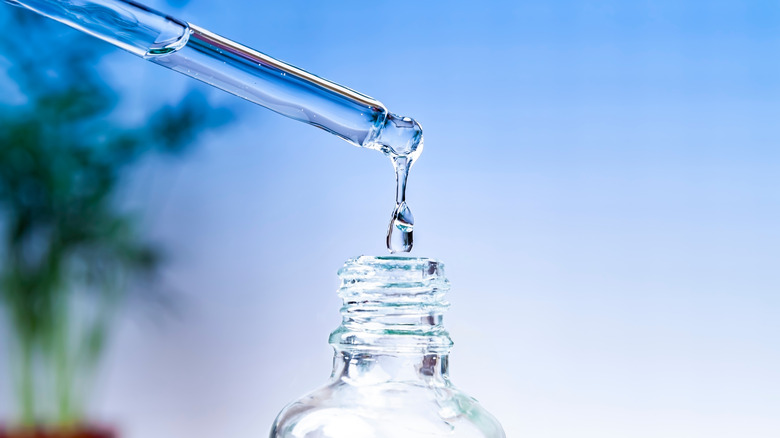Here's Why You Need To Look Out For Elastin On A Nutrition Label If You're Vegan
If you've gone vegan, you're likely all too familiar with scanning ingredient labels in the grocery store to ensure what you're buying is, in fact, animal-free. You know the clear-cut elements to avoid — meat, dairy, seafood, and eggs.
You've politely educated well-meaning friends and family members on what not to say to a vegan, and you've pretty much got the lifestyle down. But there are some sneaky ingredients you may not recognize as animal-sourced, particularly in cosmetics and skincare products.
As veganism has gained popularity, many companies have begun adding vegan-friendly identifiers to their products. If an item says "suitable for vegans" or "certified vegan," then you're in the clear (via Vegan First).
However, you can't always count on these little helpers when adding items to your shopping cart. Animal-derived components can be lurking in unsuspecting places. If you want to make sure no animals were used to make your salad dressing or eye cream, try entering the ingredient you're unsure about into a tool like DoubleCheckVegan.com.
And, while you should go gently on yourself for missing a non-vegan ingredient, some are commonly overlooked, such as elastin.
What is elastin?
Elastin is a protein sourced from bovine neck ligaments and is similar to collagen (via Vegan Food & Living). You may have heard the buzz about adding collagen-peptide supplement powder to your morning coffee for firmer skin (via Mind Body Green). Elastin has a similar effect. It's used as an anti-aging agent, hence its popularity and widespread use in skincare products.
Humans also produce elastin: It gives our tissues — you guessed it — elasticity (via Shape). Naturally, as we age, this process slows down, which is why skincare specialists introduced bovine elastin products to combat aging.
"Elastin helps keep skin tight. A lack of elastin leads to skin laxity or sagging skin," says Whitney Bowe, a New York-based dermatologist (via Shape). "Damaged, disorganized, or deficient elastin can show up as wrinkled, saggy skin, and can make scars and stretch marks more noticeable."
Now, this may bum you out if you're a vegan — and you may have also wondered if collagen supplements can be vegan – because elastin has some pretty great benefits for those in their mid-20s and older. That's when our elastin production naturally begins to decrease (via Shape).
Luckily, a vegan-friendly innovation is in the works. Geltor, a California-based bio-design company, has cracked the code for a vegan elastin product named Elastapure. While it isn't yet clear when it will hit shelves, the demand for plant-based skincare alternatives is abundantly clear.
How to preserve and boost your body's elastin production
While it may be a more slow-going method, protecting and enhancing your body's natural elastin can be achieved through your lifestyle. A healthy diet, plenty of exercise, and daily sunscreen use can all aid in keeping your elastin levels up and running (via Cleveland Clinic).
This means you can get ready to celebrate, vegans. There are several vegan foods that can increase your elastin (and collagen), and, chances are, if you're vegan, you're already eating them. Leafy greens, citrus fruits, berries, and nuts all contribute to happy elastin levels.
And, if you truly want to protect elastin production, smoking has to go. Nicotine, in both cigarettes and electronic cigarettes, ages the skin rapidly (via Cleveland Clinic).
Exercise and sunscreen are givens when it comes to skin health and vibrancy, but there are also some herbs that may aid in your elastin levels. According to SkinKraft Laboratories, aloe vera, green tea, ginseng, and cinnamon are all your new favorite skincare superheroes.
So, vegans, fear not: You now know why to look out for bovine elastin in your skincare products, and you also know how you can protect your elastin levels while maintaining your plant-based diet.


